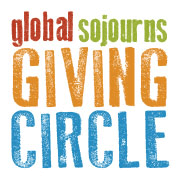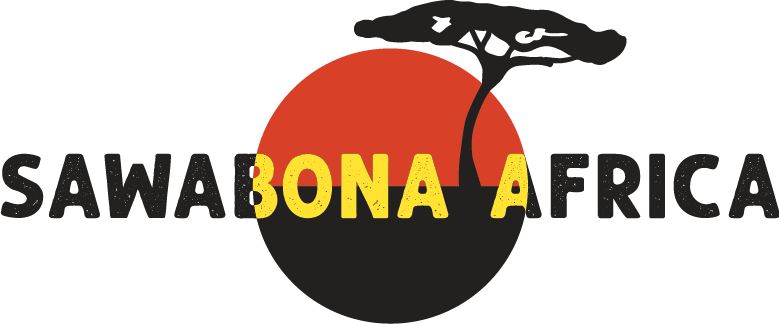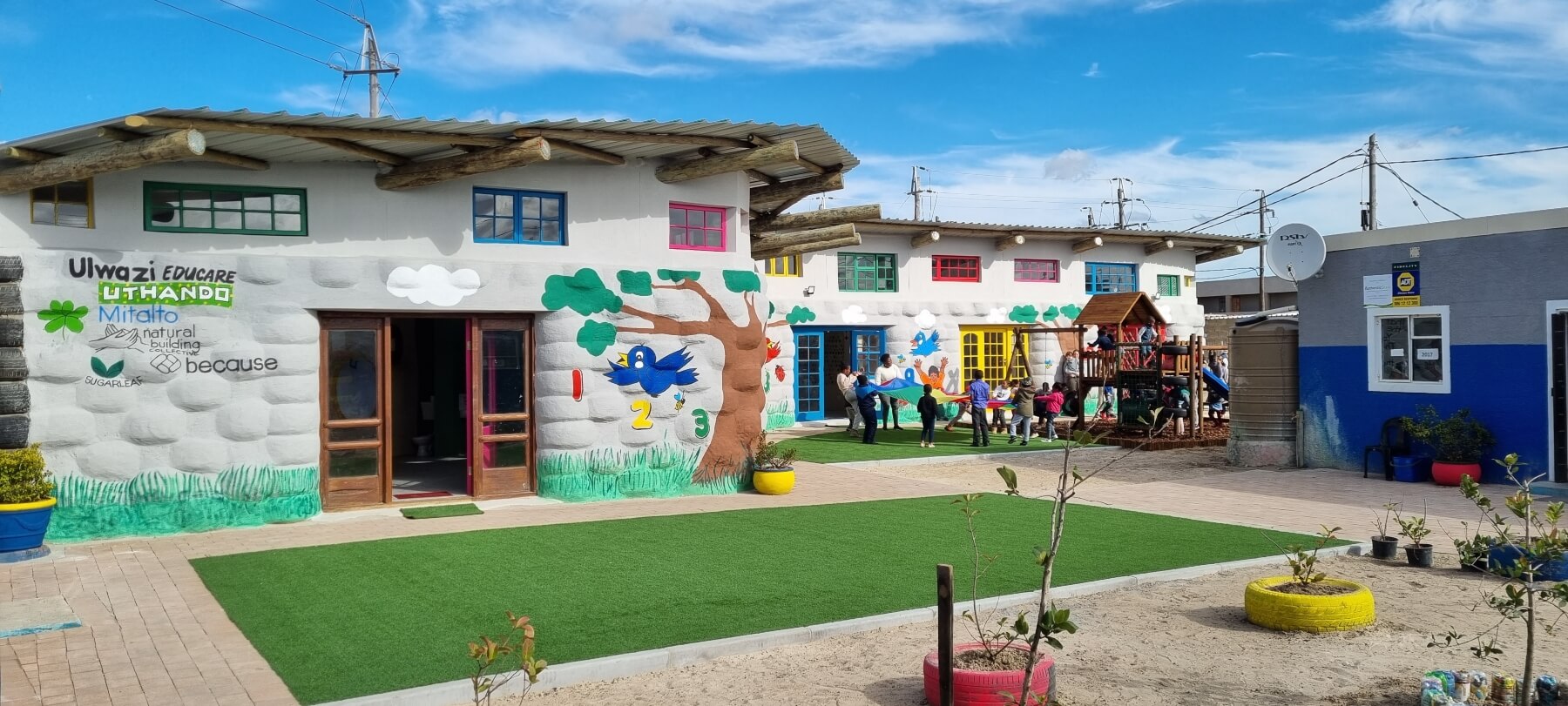
Ulwazi Educare/Goal50 Exposure In Top National Newspaper – The Daily Maverick
We were really excited to recently host Angus Begg, a journalist from one of South Africa’s most reputable weekly newspaper, The Daily Maverick. The article recently appeared in an edition of the newspaper.
Story by Angus Begg – The Daily Maverick
“We cannot let the scale of the problems around us lull us into inertia,” says James Fernie, director of Uthando (Love) South Africa, a nonprofit organisation based in Cape Town’s Harfield Village.
As you drive around Delft, past shacks, illegal electrical connections, informal toilets and litter — an overwhelming experience repeated down the length of the N2 motorway — Fernie’s words are a tonic, much like the new addition to the Ulwazi Educare school that Uthando funded in the area 20 minutes out of Cape Town.
A visit to the brightly coloured Ulwazi Educare on a grey Cape Flats day seems like something out of a fairy tale, with the curious, smiling faces of tiny children in an otherworldly structure that looks like anything but a school.
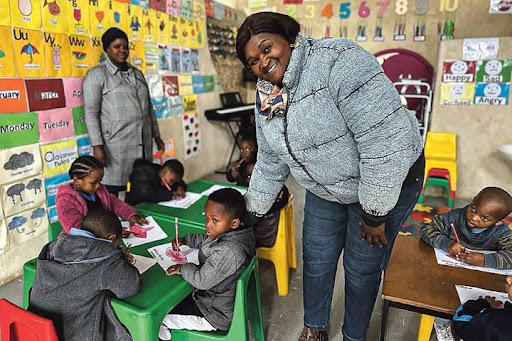
Ulwazi Educate head Patiswa ‘Patience’ Banani with children and teacher in one of her recycled and up cycled classrooms. (Photo: Angus Begg)
Ulwazi shows the success of Fernie’s vision for Uthando, which he started to support community and environmental development, offering tourists the opportunity to take part in what he calls the organisation’s “philanthropic educational excursions”, giving them the chance to make a difference in the places that they visit.
One such tourist family provided Uthando with the money to make the Ulwazi story possible. A Belgian donor says that after travelling to South Africa every year for 20 years — the family has always been “impressed and humbled by the positivity and kindness of the people who lived there, often under challenging circumstances”.
These experiences inspired the family to help through its Mitialto Foundation.
“Financing the build of this new Ulwazi education centre is one of our most important and dearest projects,” the donor says.
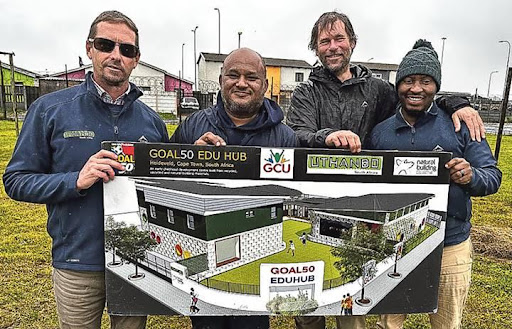
Changing landscape: James Fernie of Uthando (Love) SA, Mario van Niekerk of Great Commission United, Peter McIntosh of the Natural Building Collective and Uthando guide Xolani Maseko holding the artist’s impression of the Goal50 EduHub that McIntosh’s NBC will be creating on this patch of land in Heideveld near the N2 highway. (Photo: Angus Begg)
Fairy-tale castle
Officially opened in September last year, Ulwazi Educare was built by Natural Building Collective (NBC) from tyres, eco-bricks, clay soil and waste bricks harvested from nearby film studios.
Having worked for the City of Cape Town on similar projects, NBC founder Peter McIntosh says the city authorities have — like the private sector — been “a tremendous source of help [and] encouragement and have led the way through their engagement and projects”.
Ulwazi is a beautiful building reminiscent of Old Mother Hubbard’s home in a shoe.
In a country where small children die in pit toilets at school, McIntosh is right when he says that the living conditions in the surrounding areas “make it [the preschool] more relevant”, and in line with Fernie’s warning against being lulled into inertia.
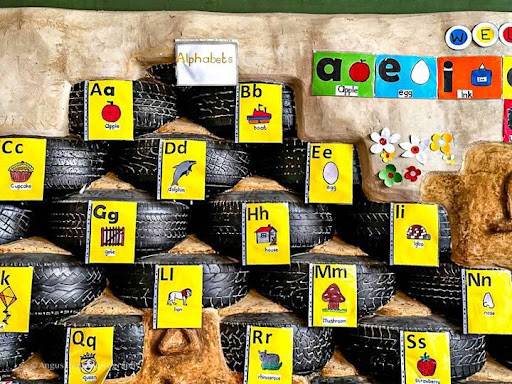
Pre-school education in a recycled and upcycled environment. Photo: Angus Begg)
Ulwazi Educare head Patiswa “Patience” Bangani — who started the school in her small Delft RDP house in 1998 — says many people in the area live in poverty, and many children don’t go to school.
“They don’t have food in their houses and the people end up doing crime, drugs and making lots of children,” she says.
She describes Ulwazi as a place of “love and caring, a space full of creativity”, where the children will be inspired to do well. The preschool has been developed from what was in 2018, according to Fernie, a few classrooms in shipping containers.
Let the children learn
The second most influential economist in the world as of December 2020, according to Research Papers in Economics, says: “The best investment for disadvantaged children and their families is in quality early childhood development from birth to five.”
James J Heckman, an economist at the University of Chicago who won the Nobel Prize, is known for his writings on the efficacy of early childhood education programmes.
“Starting at age three or four is too little too late, as it fails to recognise that skills beget skills in a complementary and dynamic way. Efforts should focus on the first years for the greatest efficiency and effectiveness.”
No surprise, then, that Professor Eric Atmore, director of Cape Town’s Centre for Early Childhood Development (ECD) — who says he has worked with “many hundreds of ECD centres” — says Ulwazi ticks all the right boxes.
“Ulwazi for me is right up there at the top … brilliantly designed, colourful, child-friendly and spacious, with committed and active teachers … ideal for young children who can only thrive in that environment,” Atmore says.
It was in the process of adding to the school this inspirational castle of tyres, bottles and recycled and upcycled bits and pieces that Fernie met NBC’s McIntosh, the architect of the creation.
McIntosh, who came to sustainable building through permaculture and living off-grid in the Klein Karoo — where he built his own home from straw bales and earth bricks 23 years ago — had his own business running sustainable building courses in Cape Town’s South Peninsula. He had recently focused on working with NGOs as a focal point to “create change”.
“Buildings that address climate change, draw from the community and address critical social issues are relevant. Ulwazi is an amazing example of how different ideas and goals can come together,” he says.
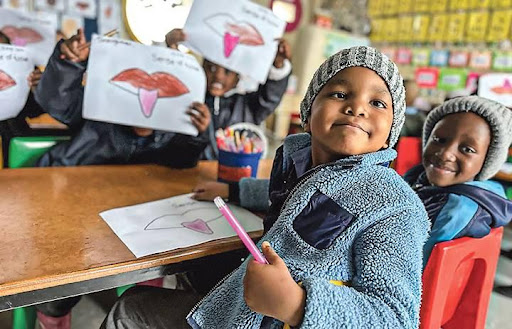
Professor Eric Atmore, director of Cape Town’s Centre for Early Childhood Development (ECD), says that of the “many hundreds of ECD centres” he has worked with, Ulwazi is “right up there at the top…brilliantly designed, colourful, child-friendly and spacious”. (Photo: Angus Begg)
Gangland and the youth
Back in 2010, when the Fifa World Cup extravaganza came to town, Fernie says, Uthando started supporting a sports and education project with similar goals, albeit with older children.
This was Great Commission United, founded in the Cape Flats suburb of Heideveld by Mario van Niekerk, who used to run with the gangs as a teen, and since 2000 has been involved in uplifting at-risk youths, giving them the opportunity to engage in a life without drugs and gangs.
Gangsterism is rife on the Flats, with some areas, like Nyanga, often named in the media along with Mexico City as one of the most dangerous places on Earth.
Stanley Jacobs, the author of Cape Flats Stories, told Daily Maverick that boys as young as 11 die in gang-related violence, and even toddlers are sometimes killed in the crossfire. Heideveld is such a suburb.
Van Niekerk says he has been using football since then to keep children off the streets. Fernie says his story is compelling: “He is one of the kindest people I know, and doing such valuable work.
“He is an outstanding example to the young people on the Cape Flats.”
Van Niekerk says: “I became a father and didn’t want my son to go through what I went through in my younger life”, explaining that Great Commission United’s name came from the Bible. “I also became a born-again Christian and felt the Lord calling me to serve the youth.”
In 2009, the reformed teen gangster says, the organisation was “only working with one school… We are now working with six primary schools out of seven in Heideveld.”
He says it helps academically struggling learners with individual tutoring, and provides coaches for schools to run their physical education classes, “employing over 300 people across eight communities in the after-school sector”.
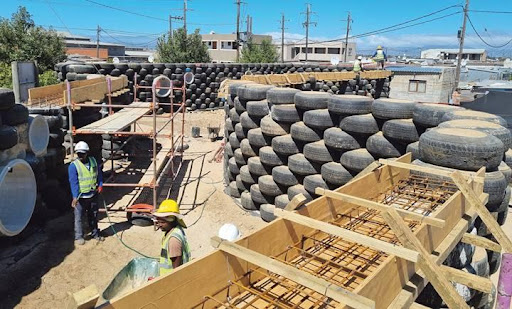
The construction of Ulwazi Educare, built of tyres, bottles, cob, eco-bricks, manhole covers and other recycled materials. (Photo: Supplied)
The power of love and football
Van Niekerk’s story of drugs, gangs and offering children a way off the streets was reported in a local newspaper in 2010, and read by a visiting international banker, Nigel Pascoe, who was in Cape Town to watch the Fifa World Cup. A resident of the Channel island of Guernsey, Pascoe made contact with Van Niekerk.
“I explained to him my dream to have an orphanage,” says the Great Commission United founder. “He [Pascoe] went back to Guernsey and established Goal50, because his idea was to raise £50,000 to help me realise that dream.”
Van Niekerk says Pascoe raised more than that amount, with which they built the orphanage and a safe house, and bought the property for their new project — an ECD twice the size of Ulwazi Educare, just off the N2 highway in Heideveld.
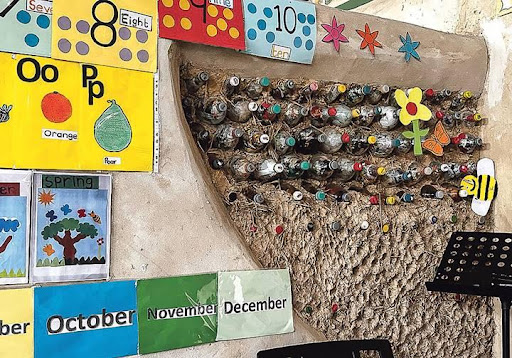
Cross-section of the classroom walls at Ulwazi Educare. The NBC’s McIntosh says the cost of the building was “R8,800 per metre square, which is lower than comparable conventional methods…demonstrates how it is a cost effective, durable, inspirational, socially and environmentally responsible building approach, creating a pathway to a better way of doing things.” (Photo: Angus Begg)
When plans come together
Fernie says he and Van Niekerk had been speaking about the importance of ECD centres on the Cape Flats since they met in 2010. “I took him to Ulwazi in 2021, as a building site, and he was blown away by a school constructed from tyres. When he saw the quality and strength of the building he did not need convincing that we could create something similar with the site owned by the Goal50 Trust in Heideveld.”
At that moment, it seems, Goal50 EduHub was born. Van Niekerk says he had already requested planning approval from the city authorities for a recycled and upcycled ECD structure “instead of a brick building”.
NBC’s McIntosh speaks of the educational, social and human value of the project, “creating many new local jobs for currently unemployed people”. He speaks of the hope that the Goal50 EduHub preschool “spawns a revolution of consciousness, bringing hope and optimism to people at a time when so many are feeling hopeless and despondent”.
McIntosh says Ulwazi Educare and the future Goal50 EduHub “raise awareness of and provide solutions to the critical challenges of climate change, litter, education and gangsterism”.
Fernie says children across Cape Town will be asked to collect rubbish and make eco-bricks, teaching them about litter and waste in a “positive and constructive way”.
McIntosh says this method of building and sustainability “doesn’t have to stop here”, and calls for it to be replicated across the country.
Fernie says that a quarter of the R4-million needed to build the Goal50 EduHub preschool has been raised so far. He invites South Africans to help to fund and build “this extraordinary ECD”. DM
This story first appeared in the Daily Maverick 168 newspaper, which is available countrywide for R29.


